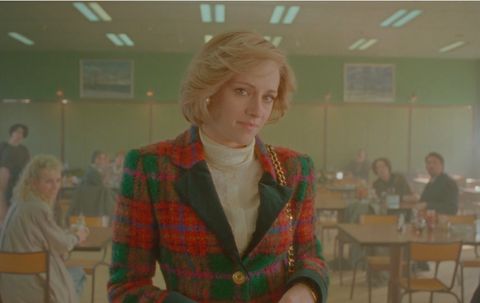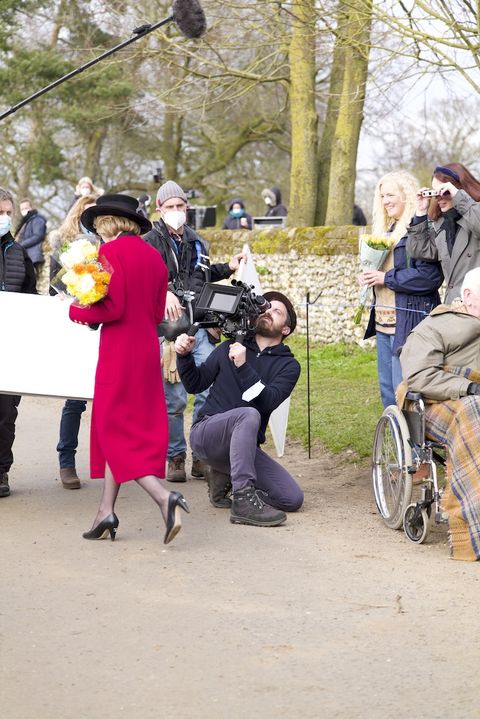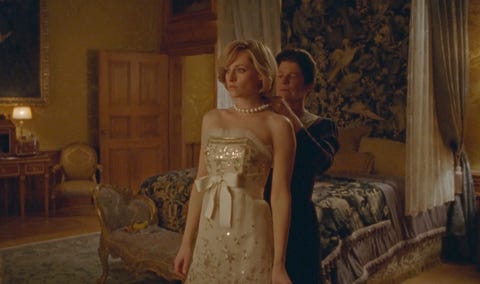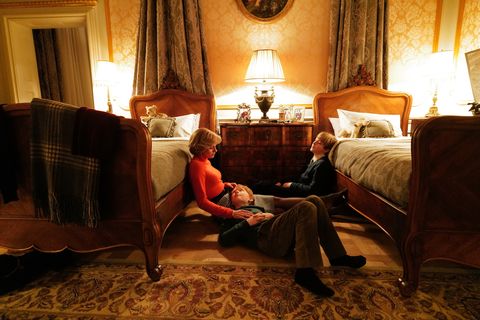How the Fashion of ‘Spencer’ Tells Princess Diana’s Story
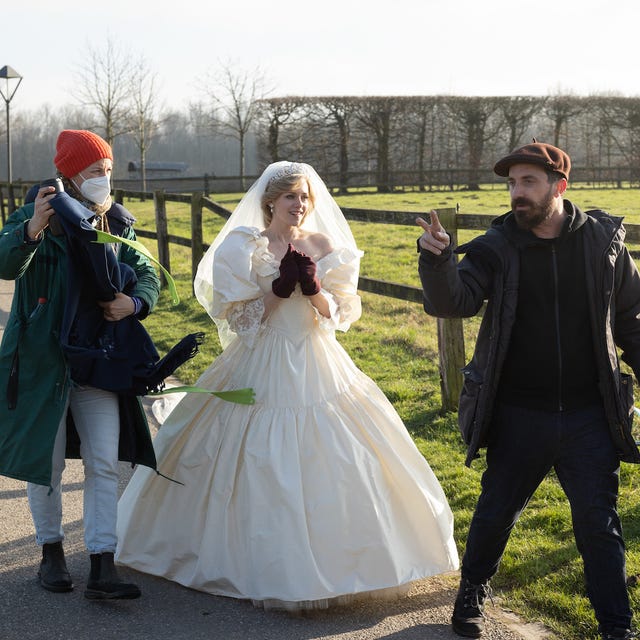
Photo Credit: Frederic Batier
How do you nail the style of one of the world’s most beloved fashion figures?
That was the challenge facing Jacqueline Durran (an Oscar winning costume designer, best known for her work on 2005’s Pride and Prejudice, but also Atonement, Little Women) with the highly anticipated film Spencer, a Pablo Larraín–directed drama that follows Princess Diana during three defining days at Sandringham, as she contemplates ending her marriage to Prince Charles.
Durran wanted to pay homage to the “essence” of Diana’s fashion, rather than precisely re-create the late Princess of Wales’s most recognizable ensembles (though a version of her iconic David and Elizabeth Emanuel wedding dress does make an appearance, albeit in a different scenario than atop the steps of St. Paul’s Cathedral). Doing so meant embracing vivid tartan prints and vibrant-hued two-piece suits, chunky pearl necklaces and eye-catching outerwear.
“[Diana’s style was] actually quite a bold style,” Durran tells BAZAAR.com. “I always think of her as quite conservative in a way, probably because she’s royal and because of the kind of class of people that she came from and the style that she started out with. But it evolved into something that was really quite bold—and that was a surprise when you really start looking at it.”
Below, we speak more with Durran about how the costumes of Spencer came to be—and why fashion lovers just can’t quit their obsession with Diana’s timeless style.
Princess Diana’s style is so iconic and obviously constantly replicated. When you were given the task of re-creating her fashion for this film, where did you begin?
It was daunting actually. A producer called me and said, “Would you like to do a film about Princess Diana starring Kristen Stewart with Pablo Larraín directing?” So it was just like, “Yes.” I didn’t even give it a second thought. Then once I had given it a second thought, it was actually daunting, because there’s so many pictures of her. There’s so much to reference, and there’s so many options. What I had to do was just limit myself. I had to give myself a date, which was 1988 to 1992, because Pablo had said he didn’t want it to be a specific point in time, so that was roughly our period. I tried to work out what things, what styles she wore repeatedly, so that I could then hone in to those things and kind of work our way through it, because it was actually overwhelming the amount of photographs of her and the amount of reference and just how many options there were.
I started off by just looking at and trying to isolate different styles. She wore geometrics in that period. She would block color, she would wear plaid, she’d have an asymmetric lapel. So I just tried to isolate those. But it was difficult—it was a difficult start.
What was the process like collaborating with Chanel to re-create versions of some of her most famous looks?
They’re such a fantastic company to work with, because they really care. They have the couture rooms, and they have so much at their fingertips that they can use to help you make anything you need. So that’s firstly, and secondly, they’re just very interested in supporting the arts—they’re really interested in helping you make the movie. They’re not so much interested in just giving you any product. They want to find the right product. I spoke specifically to the Chanel archivist, because I wanted to see things from our time period. So I talked about them sending things that Princess Diana had actually worn—not her own clothes, but the similar styles.
In the movie, Pablo wanted extra evening dresses for the montage scene, so they sent over lots of evening dresses from the ’80s. And that’s how we came across the dress that we ended up using, which was the beautiful cream dress with the gold embroidery. I’m not sure of the date, possibly 1988, but it’s a Karl Lagerfeld design from the ’80s, and they sent that over and everyone fell in love with it. Then we had the nightmare situation that we all wanted to use the dress because it was so beautiful, but in fact, it was too precious to use. So we had this awful moment where we thought we found a dress that we really wanted to be the kind of central evening dress and that it was taken away. But Chanel amazingly said that they would re-create it for us in the old couture workroom. So they copied an original dress of their own in their workroom specifically for the movie for question. They don’t want to dominate the film; they just want to support us creating the vision we want to. So it was a really great collaboration.
What are some of the key details it takes to really nail the Diana look?
Once I started looking at it all and seeing how she created her styles, I was really overwhelmed by how chic she was and how her style evolved through the ’80s. You have the very naive start at the beginning of the ’80s when she was first royal, and she was slightly overwhelmed. I think the clothes she wore then, in a way, didn’t quite work for her. Then she really got into a stride and it evolved through time. Later in her life, she had a different style again, which was just so much more relaxed and so much more of herself, rather than the kind of royal presentational costumes we’re used to.
So much about her wardrobe seems to give a glimpse into what she was experiencing emotionally in her life—especially in the film. What story were you aiming to tell about Diana during those three days at Sandringham with the looks that you put together?
There’s so many different layers of costume in the film. There’s the formal structure of the clothes that are laid out that mark the passage of time and mark each event of each day—which is the thing that is kind of oppressing her. Then there’s her own clothes that she wears when she doesn’t have to wear the formal clothes. Then there’s the flashback clothes, or the clothes that Pablo wants to put into the montage, which is just another time—and it’s not necessarily a flashback, but it’s just an alternative view of her.
I really wanted to make sure that the formal structure really looked like Diana. Even though we didn’t want to replicate anything specifically, I really wanted to make sure that I could create the aura of her so that everything felt like these were really the clothes that she could have worn. That was my biggest ambition in the film. It goes back to trying to find the things that would resonate most strongly for everybody and to create the clearest picture of her.
Why do you think Diana’s style has stood the test of time? There’s probably more interest in her style now than when she was alive.
I agree with you. And I think it’s quite strange, because I think that she’s become more and more fashionable [over time]. Having lived through the ’80s, I wasn’t interested at that time in her style. It was a sort of separate royal style that wasn’t in the mainstream of fashion. It may have been copied and it may have influenced people, but it wasn’t really fashionable in the real sense. But now, it’s become more and more [on trend]. Now I feel like it really is part of high fashion, and that’s a really interesting thing. I don’t know quite why that has happened apart from the fact that she is so chic and her life ended up ending tragically. But I do think it’s interesting that she has become a real fashion icon. And, of course, a princess. I mean, that’s what it is in a way. It’s a fable, isn’t it? It’s a fairy tale.
This content is created and maintained by a third party, and imported onto this page to help users provide their email addresses. You may be able to find more information about this and similar content at piano.io

